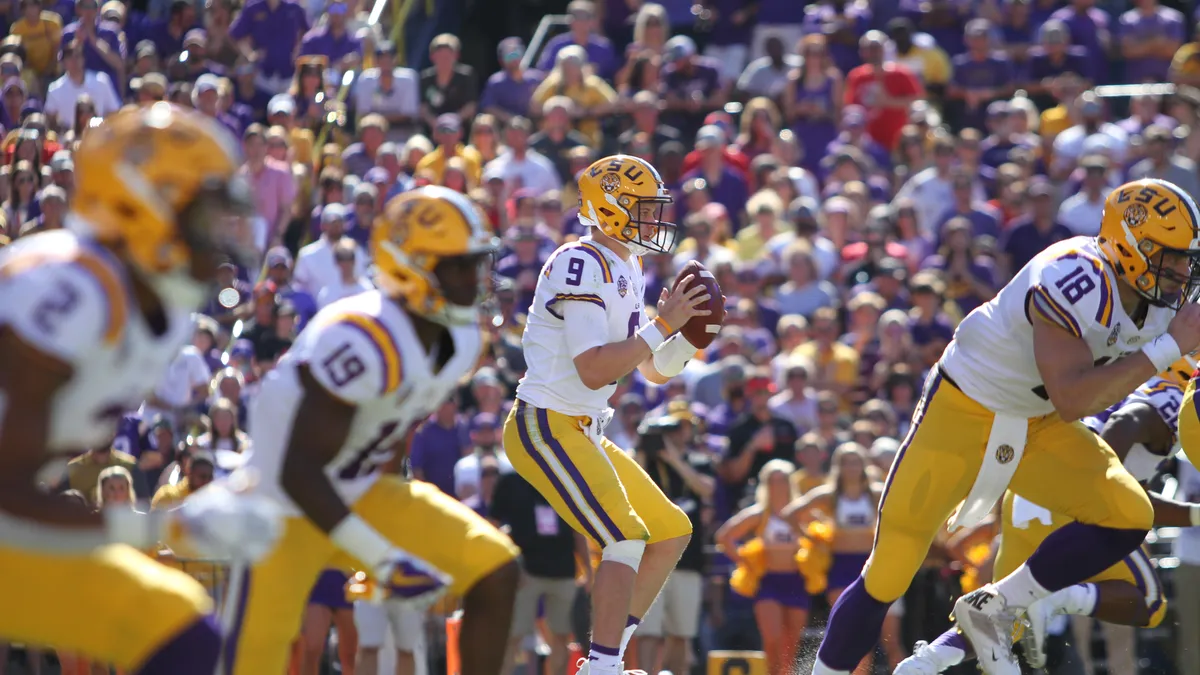Dive Brief:
- Dozens of student-athletes have tested positive for the coronavirus over the past few weeks, calling into question whether colleges will be able to safely reopen campuses this fall.
- Last week, the NCAA Division I Council approved a plan to allow football teams to start mandatory meetings and preseason camps in July, ESPN reported.
- At least one institution, Bowdoin College, canceled sports for the fall season because of the pandemic. Health officials and sports management experts are cautioning other institutions to prioritize players' safety.
Dive Insight:
The NCAA began allowing colleges to hold voluntary athletics activities in all Division I sports on June 1. Since then, at least 36 colleges have publicly said one or more student-athletes or sports staff members have recently tested positive for the coronavirus, according to a list kept by USA Today.
Among the hardest hit is Clemson University, in South Carolina, which announced last week that 28 of its student-athletes and staff members tested positive for the virus. Most of the affected people haven't had symptoms, and none have been hospitalized, the university said in a statement last week.
At the beginning of June, Clemson began a three-stage process to reopen its campuses by bringing back faculty and staff members who couldn't complete their work remotely. Although the university plans to resume in-person instruction in the fall, it previously said that doing so hinges on coronavirus case numbers falling in the surrounding area.
However, South Carolina's cases have surged in the last month, and Clemson and city officials announced Sunday that they detected elevated levels of the coronavirus in the community's wastewater.
Outbreaks have hit other athletics departments. Fourteen Kansas State University student-athletes have tested positive for the coronavirus as of June 19, the university announced. In response, it is pausing all voluntary workouts for football players for two weeks.
Louisiana State University quarantined a quarter of its 115 football players because they either tested positive for the virus or were in close contact with those who had, Sports Illustrated reported. The state is among those whose coronavirus cases were on the rise last week.
"We were prepared from the get-go for a lot of virus," Shelly Mullenix, a senior associate athletic trainer at the university, told Sports Illustrated. "The good news is we're seeing subtle virus illness."
Last week, the NCAA approved a plan for summer activities and preseason practice for the upcoming football season, which begins in late August.
"There's such a rush to get back to football," said David Ridpath, an associate professor of sports administration at Ohio University and president of The Drake Group, which has advocated for more protections for college athletes. Although the loss of a season could be an "economic disaster," he added, colleges should proceed carefully.
Thirty football players at the University of California, Los Angeles have signed a document saying they don't trust the university to prioritize their health and alleges it has previously mismanaged injury cases, the Los Angeles Times reported.
They're demanding that a "third-party health official" ensure preventative measures against the virus are being followed during football activities. They also want to be able to decide whether to return this season without jeopardizing their scholarships.
Although athletes are young, colleges shouldn't assume they'll be immune to complications from the virus, said Ellen Staurowsky, a sport management professor at Drexel University. Little is known about the virus's long-term health implications, but some studies suggest it could cause permanent lung damage.
Colleges should use this crisis to make sports safer for players, she contended. "If you look at this industry right now, it's plagued by lawsuit after lawsuit," she said.
Indeed, dozens of student-athletes and their families have sued their colleges and the NCAA, alleging that they failed to prioritize their health and safety.
One potential solution would be an independent association representing college athletes. "Here we are in this powerful moment where we can really see the fissures, where we can really see the threats and we can see the lack of protections," Staurowsky said. "It's an incredible burden to put on these athletes to push back against this."
The NCAA did not respond by press time to an email from Education Dive on Monday afternoon asking whether the new coronavirus cases will impact its policies for the fall season.











